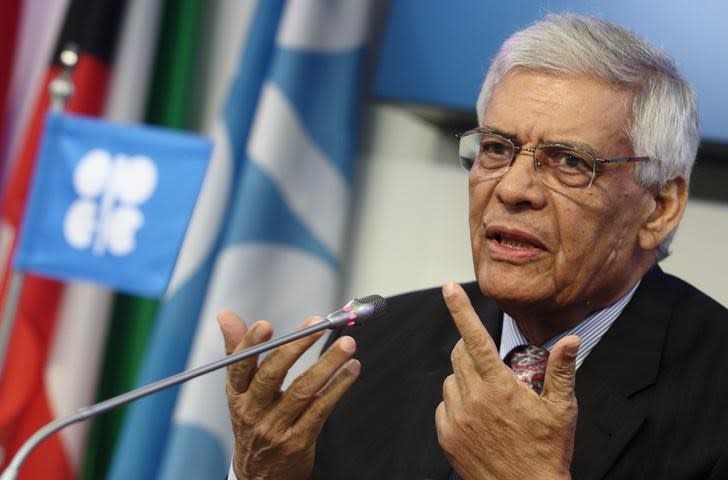OPEC chief defends policy, says group to try to ride out price fall
By William Maclean
DUBAI (Reuters) - Oil producers group OPEC can ride out a slump in oil prices and keep output unchanged, its head said on Sunday, arguing market weakness did not reflect supply and demand fundamentals and could have been driven by speculators.
Speaking at a conference in Dubai, Abdullah al-Badri defended November's decision by the Organization of the Petroleum Exporting Countries not to cut its output target of 30 million barrels per day (bpd) in the face of a drop in crude prices to multi-year lows.
"We agreed that it is important to continue with production (at current levels) for the ... coming period. This decision was made by consensus by all ministers," he said. "The decision has been made. Things will be left as is."
OPEC policy remains a crucial factor in global economic prospects after Brent crude settled at below $62 a barrel on Friday, following a steep descent which hammered energy stocks and currencies exposed to crude exports.
Kuwait's oil minister Ali al-Omair said on Sunday OPEC's decision to keep output unchanged was intended to retain market share, even if it had a negative impact on prices, state news agency KUNA said. [ID:nL6N0TY0OM]
The move left benchmark grades at nearly half levels set earlier this year and doused appetite for riskier assets, pushing investors into the safety of government debt despite strong U.S. consumer sentiment.
In a further reaction to slumping oil, stock markets across the Middle East fell sharply on Sunday, adding to a plunge in Gulf equity markets which has wiped out roughly $150 billion of value since the end of October.
Some say selling may continue as few participants are yet willing to call a bottom for markets. [ID:nL6N0TX05M]
But Badri suggested the crude price fall had been overdone. "The fundamentals should not lead to this dramatic reduction (in price)," he said in Arabic through an English interpreter.
He said only a small increase in supply had lead to a sharp drop in prices, adding: "I believe that speculation has entered strongly in deciding these prices."
Asked if OPEC planned an emergency meeting before its next scheduled gathering in June, or a meeting with non-OPEC producers, Badri said such meetings would not have an effect on oil prices.
NO TARGET
OPEC had no target price for oil, Badri said in a reiteration of policy, and urged Gulf states to continue investing in exploration and production, saying the United States would continue to rely on Middle East crude for many years.
Stopping new production projects would bring about a situation in which prices "will go back to $147 a barrel as in 2008. This was a result of a previous such situation," he said, recalling the potential market effect of a dearth in supply brought about by inadequate upstream investment.
Badri said OPEC sought a price level that was suitable and satisfactory both for consumers and producers, but did not specify a figure. The OPEC chief also said November's decision was not aimed at any other oil producer, rebutting suggestions it was intended to either undermine the economics of U.S. shale oil production or weaken rival powers closer to home.
"Some people say this decision was directed at the United States and shale oil. All of this is incorrect. Some also say it was directed at Iran and Russia. This also is incorrect," he said.
However Saudi Arabia's oil minister Ali al-Naimi had told last month's OPEC meeting the organization must combat the U.S. shale oil boom, arguing for maintaining output to depress prices and undermine the profitability of North American producers, said a source who was briefed by a non-Gulf OPEC minister.
Badri said OPEC members Iran and Iraq, their oil sectors restricted respectively by sanctions and insecurity, both had the potential to raise production, but significant increases were possible only after two or three years.
Adding to the effects of OPEC's unchanged production level, a lower demand growth forecast from the International Energy Agency further put the skids under oil on Friday, raising concerns of possible broader negative effects such as debt defaults by companies and countries heavily exposed to crude prices.
There was also talk of the price trend adding to deflation pressures in Europe, increasing bets that the European Central Bank will be forced to resort to further stimulus early next year.
(Additional reporting by Sami Aboudi and Olzhas Auyezov, Editing by David Holmes and Rosalind Russell)



